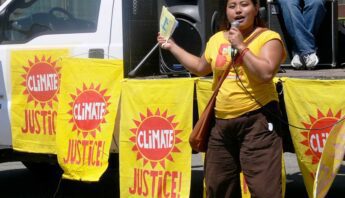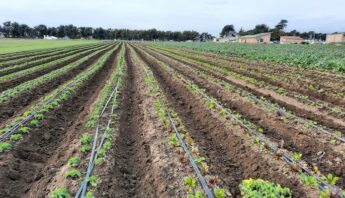One of the differences between last year’s heavily policed climate meetings in Copenhagen and this year’s meetings in Cancun was that you could actually sneak in and out of the official UNFCCC venue. And so I did. Curious to see how it is that government ministers from all over the world manage to so consistently fail to represent the best interests of their peoples, I snuck in and out of several of the side events that were taking place in this expensive island resort.
One side event I fancied was the Agriculture Day organized by CGIAR (Consultative Group on International Agricultural Research). As my work with PAN Asia and the Pacific revolves around food and small food producers, I wondered what would be CGIAR’s take on climate change and agriculture. CGIAR is the collection the research centers that serve the giant agrochemical corporations responsible for the Green Revolution in the 70s, causing immense damage to the environment and health of farmers. Lately they've been pushing a new brand of one-technology-fixes, the Gene Revolution.
In Cancun, CGIAR positioned itself as the holder of solutions to climate change and its impact on agriculture. Agriculture being a victim and villain of climate change, CGIAR proposed a “triple win” solution: high productivity through intensification in agriculture, thus ensuring food security, and “sustainable” production resulting in lower GHG emissions. Good eh?
It really depends how you look at it.
If you look at the track record of CGIAR, this triple-win solution means corporate as opposed to small-scale farming (which they say is bankrupt, not economically viable). An interesting point of view considering that it’s small-scale farming that feeds the vast majority of the world’s peoples. And their vision of “sustainable” production hinges on the introduction of genetically modified “climate resistant” seeds, which are dependent on the pesticides that are coincidentally produced by the same agrochemical corporations that support CGIAR. So my take on their claim that genetically modified agriculture is sustainable is that they are actually referring to sustaining profit margins.
Absent from the whole discussion was any recognition that most of GHG emissions caused by agriculture come from corporate farming, not the small-scale subsistence farmers in developing countries. So at the end of the side event, it was indeed very clear to me that the Agriculture Day was simply a PR gig of the corporations behind CGIAR. In the words of the people’s movements gathered in Cancun, CGIAR’s triple-win solution is yet another false solution to the worsening climate crisis.
Incidentally, there were very few genuine farmers organizations among the 400 participants of Agriculture Day. But that is understandable. After all, small-scale farmers have no place in corporate agriculture.
Gilbert Sape is Coordinator of the Food Sovereignty and Ecological Agriculture Program of Pesticide Action Network Asia and the Pacific.
GroundTruth will occasionally feature guest blogs from the PAN International network, of which PAN North America is proud to be a part. Last week, for instance, we featured the launch of two new publications from PAN AP, Climate Change and Crop Protection : Anything Can Happen and a monograph on solutions, Weathering the Climate Crisis: The Way of Ecological Agriculture. The publications were announced during the December 6 side event, “Just Transition Now! Towards a Peoples Protocol on Climate Change,” sponsored by the Peoples Movement on Climate Change.






